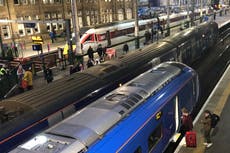Britain’s railways ‘not fit for purpose’ and ‘financially unsustainable’, transport secretary warns
Mark Harper outlines ‘fundamental reform’ for trains including setting up Great British Railways and simplifying fares


Britain’s railways are “not fit for purpose” and “financially unsustainable”, the transport secretary has said.
In the annual George Bradshaw Address in London on Tuesday, Mark Harper described the railways currently as “mired in industrial action” and “historically unable to deliver major improvements at good value for the taxpayer”.
Setting set out a programme of reform from industry structure to fares, he said: “I won’t mince my words: operating the railways is now financially unsustainable. And it isn’t fair to continue asking taxpayers to foot the bill. Many of whom don’t regularly use the railways, including plenty of my constituents in the Forest of Dean.
“Yet they find themselves subsidising an industry that delivers only 1.5 per cent of all journeys, that disproportionately serves commuters in the South East, and whose funding comes at the expense of other vital transport upgrades.
“Left untreated, we will drive passengers away with poor performance, which leads to fewer services, which will drive more passengers away and so on and so on.”
Only major reform, he said, can break that cycle of decline. The transport secretary said that Great British Railways will take over the running of trains and the network, though he insisted it was not “a return to British Rail”.
The new organisation – whose headquarters location will be announced soon – will be an arm’s length body intended to “take politics out of the railways”.
Mr Harper said it was “the only way to build a truly commercially led industry”.
Andrew Haines, chief executive of Network Rail, will be heading up Great British Railways. He praised the transport secretary’s “clarity of purpose”. But he said: “Our industry is cursed by micro-management at the moment.”
Single-leg pricing, regarded by many rail experts as essential to attracting new passengers, will be cautiously rolled out, Mr Harper said. Initially fare reform – involving reducing single off-peak fares to half the return fare – will be trialled only on the LNER network.
LNER is the main operator on the East Coast main line, linking London with Yorkshire, northeast England and Scotland.
The transport secretary said: “Passengers are not going to be attracted to the railways if they think it’s a rip-off.”

Mr Harper, the third transport secretary in five months, also referred to the strike action that has blighted rail travel across Great Britain since June last year.
He said: “Sunday services are essentially dependent on drivers volunteering for overtime. Which means, despite best efforts, we can’t run a reliable seven-day-a-week railway on which customers can depend.
“It’s why I’ve been clear throughout this period of industrial action that modernising working practices must be part of reform.”
He stressed a “best and final” offer was on the table. “Best and final means what it says,” he says.
Unions are likely to respond angrily to Mr Harper’s insistence on pay rises being contingent on changed working conditions.
With cuts in government spending looming, there had been reports that High Speed 2 (HS2) might be cut back further – possibly losing connections with central London.
But Mr Harper insisted HS2 will run from London Euston, rather than the suburban station of Old Oak Common in west London, via Birmingham to Manchester.
The shadow transport secretary, Louise Haigh, said: “The Conservatives cannot hide from their dismal record – fares soaring, record cancellations, second-rate infrastructure, and failing operators handed millions in taxpayer cash.
“Thirteen years of Conservative failure has broken our railways. Now the arsonists are claiming only they can put out the fire.
“The next Labour government will put passengers back at the heart of our railways, and build the infrastructure fit for the century ahead, unlocking jobs and growth.”
Join our commenting forum
Join thought-provoking conversations, follow other Independent readers and see their replies
Comments



Bookmark popover
Removed from bookmarks